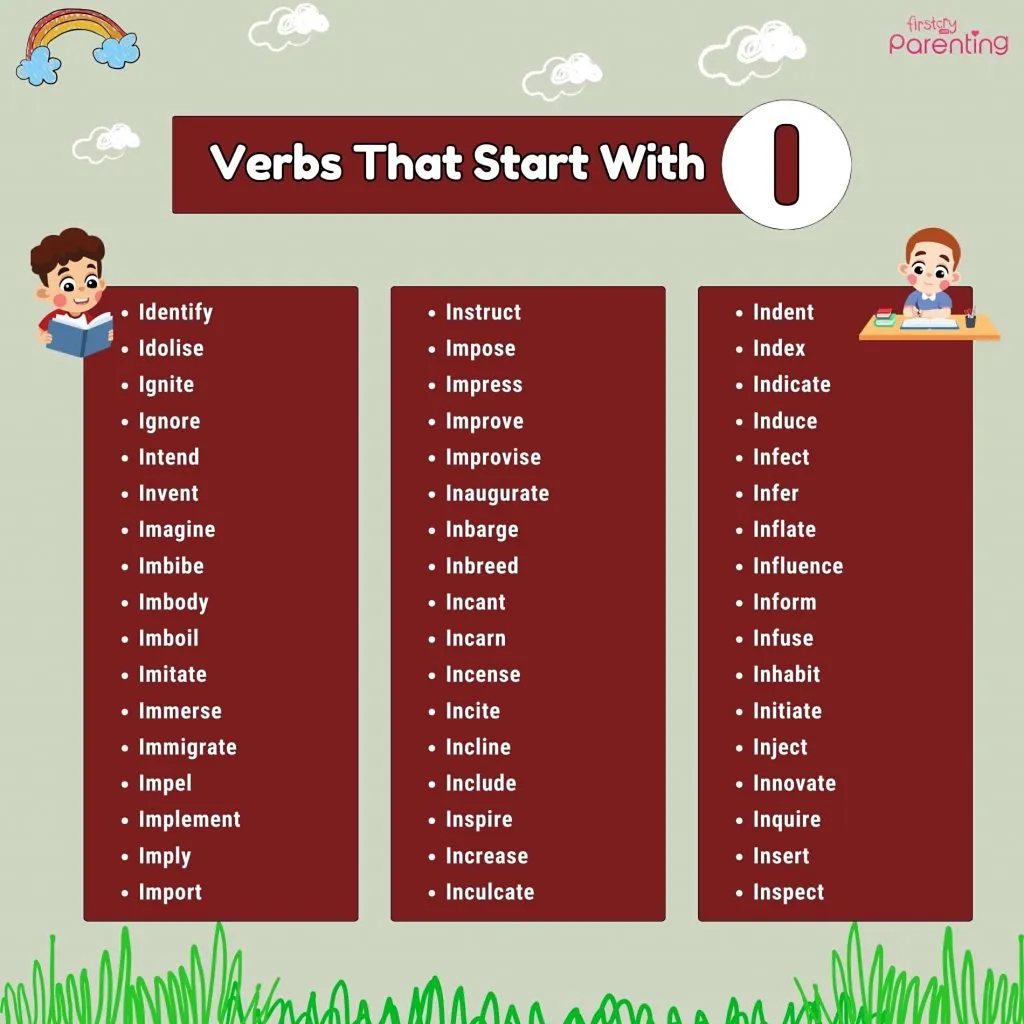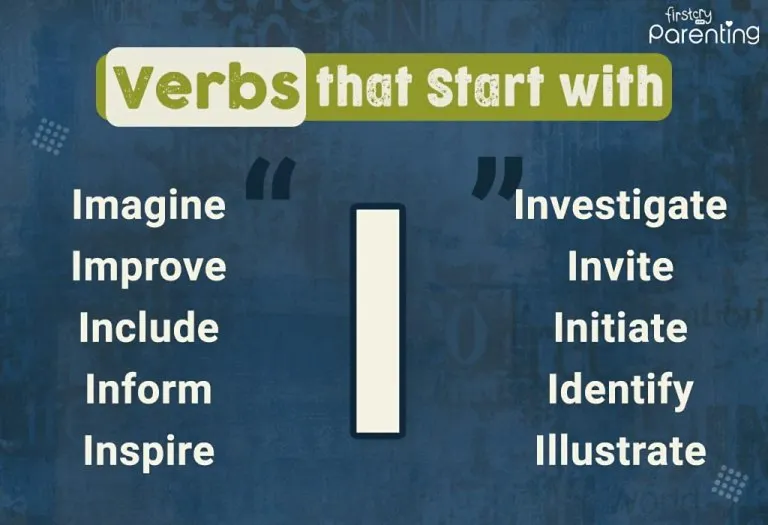Verbs That Start With I in English (With Meanings & Examples)
- What Are the Verbs Beginning With I?
- Common Verbs Starting With I
- Action Verbs That Start With I
- Positive Verbs That Start With I
- More Verbs That Begin With “I”
- FAQs
- Also, Discover the Verbs That Start With A to Z
When it comes to enriching the vocabulary of our little ones, exploring verbs that start with “I” can be an exciting journey. These verbs enhance their linguistic skills and open a world of imaginative possibilities. Whether you’re a parent, teacher, or caregiver, introducing verbs that start with I for preschoolers and kids is a beautiful way to engage young minds. This guide explores intriguing verbs, providing meanings and examples to make learning fun and interactive. We aim to support the growth of vocabulary for kids in a warm, personal, and engaging manner, turning each learning moment into an opportunity for exploration and discovery. Let’s dive into the world of “I” verbs and uncover the magic they hold for our young learners.
What Are the Verbs Beginning With I?
Verbs starting with “I” are actions, occurrences, or states of being that initiate with the letter “I.” These verbs with “I” encompass various activities we can perform, experience, or observe. From “imagine” to “improve,” each verb unlocks a unique action, making the English language vibrant for learners of all ages.
Common Verbs Starting With I
Exploring common English verbs starting with “I” offers a fascinating insight into the diversity of actions and states we can express in English. These verbs range from everyday activities to more complex concepts, beginning with the enchanting letter “I.” Here, we present 15 verbs that are not only useful but also essential for enriching one’s vocabulary and understanding of the language.
1. Identify
To recognise or be able to name someone or something.
Example: He could identify the bird by its song.
2. Ignore
To intentionally not listen or give attention to.
Example: It’s often best to ignore negative comments on the internet.
3. Illustrate
To explain or make something clear by using examples, charts, pictures, etc.
Example: The teacher uses diagrams to illustrate the concept.
4. Imagine
To form a mental image of something.
Example: Imagine a world where peace reigns supreme.
5. Implement
To put a decision, plan, agreement, etc., into effect.
Example: The new policies will be implemented next month.
6. Improve
To make or become better.
Example: She aims to improve her skills by practising daily.
7. Include
To make someone or something a part of a group or collection.
Example: Make sure to include all the relevant details in your report.
8. Inform
To give knowledge or information to someone.
Example: The teacher informs the students about the upcoming field trip.
9. Initiate
To cause something to begin.
Example: The program was initiated to support local businesses.
10. Inspire
To fill someone with the urge to do something creative.
Example: Her courage inspires others to follow their dreams.
11. Integrate
To combine one thing with another to become a whole.
Example: The software was integrated into the existing system seamlessly.
12. Intend
To have a plan or purpose in mind.
Example: She intends to finish her novel by the end of the year.
13. Interact
To communicate or work together.
Example: Children learn best when they interact with their peers.
14. Investigate
To carry out research or inquiry into something thoroughly and systematically.
Example: Detectives investigate the scene for clues.
15. Invite
To ask someone to go somewhere or do something.
Example: They decided to invite their neighbours over for dinner.
By familiarising ourselves with these verbs, starting with “I,” we can expand our vocabulary and enhance our ability to communicate effectively and creatively in English.
Action Verbs That Start With I
Diving into the realm of action verbs that start with the letter “I” opens up new avenues for expressing dynamic activities and motions. These verbs are pivotal for describing actions in various contexts, from daily conversations to storytelling and academic writing. Here, we spotlight 15 action verbs that enrich our vocabulary and energise our language with vivid descriptions of actions.
1. Illuminate
To light up or make clear.
Example: The lanterns illuminate the garden beautifully at night.
2. Imitate
To take or follow as a model.
Example: Children often imitate their parents’ behaviours.
3. Immigrate
To come to live permanently in a foreign country.
Example: Her family immigrated to find better opportunities.
4. Inflate
To cause it to become larger or more expanded.
Example: He inflates the balloons for the party.
5. Influence
To have an effect on the character, development, or behaviour of someone or something.
Example: Great leaders influence their followers positively.
6. Innovate
To introduce new methods, ideas, or products.
Example: Tech companies constantly innovate to stay ahead.
7. Install
To put in place or set up for use.
Example: They install the new software on all company computers.
8. Instruct
To teach or provide knowledge.
Example: The coach instructs the team on new strategies.
9. Interrupt
To stop the continuous progress of a process.
Example: The sudden storm interrupts their picnic.
10. Intertwine
To twist or twine together.
Example: The vines intertwine around the old tree.
11. Intimidate
To frighten or overawe someone, especially to make them do what one wants.
Example: The competition does not intimidate the young athlete.
12. Introduce
To present something or someone for the first time.
Example: He introduces his friends to the concept of minimalism.
13. Invent
To create or design something that has never existed before.
Example: She invents a new gadget that makes everyday life easier.
14. Invest
To spend money with the expectation of a profit.
Example: Many people invest in stocks to grow their savings.
15. Involve
To include someone or something as a necessary part.
Example: Solving the puzzle involves critical thinking and teamwork.
These action verbs that verb start with the letter “I” showcase the versatility and dynamism of the English language, offering us numerous ways to articulate actions vividly and effectively.
Positive Verbs That Start With I
Positive verbs that start with “I” are like little sparks of joy and motivation in our language, capable of uplifting spirits and inspiring action. These verbs carry a positive connotation, encouraging a sense of well-being, accomplishment, and kindness. Below, we explore 15 positive verbs beginning with “I,” each accompanied by its meaning and an example sentence to demonstrate how these words can convey positivity and inspire.
1. Idolise
To admire, revere, or love intensely or excessively.
Example: Young fans often idolise their favourite musicians.
2. Ignite
To set on fire, to kindle, to excite or inspire.
Example: His speech ignited a passion for change among the listeners.
3. Illustrate
To clarify something by giving examples.
Example: She illustrates her points with exciting anecdotes.
4. Imbibe
To absorb or take in, especially knowledge or a quality.
Example: She imbibed the wisdom of her elders and carried it with her throughout her life.
5. Immerse
To become thoroughly involved in something.
Example: Immerse yourself in the book and let your imagination run wild.
6. Incandesce
To glow with heat or light, typically as a result of being heated.
Example: As the metal was heated, it began to incandesce.
7. Incant
To recite a spell or chant, often with magical or mystical significance.
Example: The shaman began to incant ancient prayers, calling upon the spirits to heal the sick child.
8. Inculcate
To instil an idea, habit, or attitude by persistent instruction.
Example: The teacher sought to inculcate a love for learning in her students by making her lessons engaging and interactive.
9. Indulge
To allow oneself to enjoy the pleasure of.
Example: It’s okay to indulge in your favourite dessert occasionally.
10. Indurate
To make resistant to or insensitive to something.
Example: His experiences in the army indurated him to the harsh realities of war.
11. Infuse
To fill pervade.
Example: She infuses her paintings with emotion, making them truly captivating.
12. Inosculate
To unite or blend often refers to merging blood vessels or plant stems.
Example: The roots of the trees in the forest inosculated, forming a dense network beneath the soil.
13. Inure
To accustom someone to something, especially something unpleasant.
Example: Growing up in a rough neighbourhood, he became inured to the sounds of sirens and street noise.
14. Inveigle
To persuade someone to do something through flattery or deceit.
Example: The con artist tried to inveigle the elderly couple into investing in his fraudulent scheme.
15. Invigorate
To give strength or energy to.
Example: Morning exercise invigorates the body for the day ahead.
These positive verbs that start with “I” remind us of the power of our words to foster positivity, motivate others, and express our best selves. Let’s embrace these verbs in daily communication to spread joy and encouragement.
More Verbs That Begin With “I”

In this section, we explore a diverse array of verbs starting with the letter “I” that have not been discussed in previous segments. These verbs span a range of actions and concepts, enriching our vocabulary and offering new ways to express actions and ideas.
| Verb | ||
| Imbezzle | Import | Incubate |
| Imbitter | Impose | Indicate |
| Imbibe | Inarch | Induce |
| Imblazon | Improvise | Infer |
| Imbody | Inaugurate | Inaugur |
| Imboil | Incarcerate | Inbarge |
| Imbolden | Incense | Inbreed |
| Implicate | Imprint | Ingrain |
| Imply | Impinge | Inhabit |
| Importune | Increase | Incanton |
| Impoverish | Indent | Inject |
| Impress | Index | Inquire |
| Imprint | Indict | Insert |
| Improvise | Individualise | Inspect |
| Incite | Indoctrinate | Inspire |
| Incline | Impel | Incarn |
| Incorporate | Infect | |
This collection of verbs beginning with “I” demonstrates the wide variety of actions and processes we can describe in English. From “Illuminate,” which can mean to light up or to clarify an idea, to “Intend,” which expresses a plan or purpose, these verbs enhance our ability to communicate.
FAQs
1. What are the benefits of expanding one’s vocabulary with verbs starting with I?
Expanding your vocabulary with verbs starting with I enhances your ability to express actions and emotions more precisely and creatively in written and spoken English.
2. How can learning verbs starting with I improve my language skills?
Learning verbs starting with I can improve your language skills by broadening your linguistic range, enabling you to convey thoughts and ideas more effectively and diversely.
Also, Discover the Verbs That Start With A to Z
| Act | Nurture |
| Bake | Operate |
| Create | Plan |
| Dance | Qualify |
| Evolve | Research |
| Form | Sing |
| Guide | Think |
| Help | Use |
| Incend | Value |
| Jog | Work |
| Knit | Xenonate |
| Lead | Yearn |
| Move | Zone |
Exploring verbs that begin with the letter “I” opens up many possibilities for expression, enriching our ability to convey actions, emotions, and ideas with greater specificity and nuance. This journey through the alphabet enhances our vocabulary and deepens our understanding of the English language and its vast potential for communication. As we expand our linguistic repertoire, we empower ourselves to engage more effectively and creatively in personal and professional contexts.
Also Read: Verbs That Start With A to Z
| A | B | C | D | E | F | G | H | I | J | K | L | M |
| N | O | P | Q | R | S | T | U | V | W | X | Y | Z |
Was This Article Helpful?
Parenting is a huge responsibility, for you as a caregiver, but also for us as a parenting content platform. We understand that and take our responsibility of creating credible content seriously. FirstCry Parenting articles are written and published only after extensive research using factually sound references to deliver quality content that is accurate, validated by experts, and completely reliable. To understand how we go about creating content that is credible, read our editorial policy here.














.svg)
















